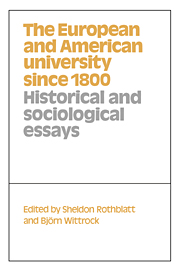Book contents
- Frontmatter
- Contents
- Notes on the contributors
- Introduction: universities and ‘higher education’
- Part I Fact and ideals in liberal education
- Part 2 The State, the university, and the professions
- Part 3 The ambiguities of university research in Sweden and the United States
- Part 4 Complexity
- Part 5 The ironies of university history
- 9 The modern university: the three transformations
- Index
9 - The modern university: the three transformations
Published online by Cambridge University Press: 04 August 2010
- Frontmatter
- Contents
- Notes on the contributors
- Introduction: universities and ‘higher education’
- Part I Fact and ideals in liberal education
- Part 2 The State, the university, and the professions
- Part 3 The ambiguities of university research in Sweden and the United States
- Part 4 Complexity
- Part 5 The ironies of university history
- 9 The modern university: the three transformations
- Index
Summary
Introduction
The university is, together with the Church, the most time-honoured of all present-day macro-societal institutions. Yet arguably it is also the most innovative. It is the source of our ever-growing technical mastery of nature and of the meaning we attribute to that mastery. Bits and pieces of university-based knowledge constantly trickle into the daily discourse of society, provide information and ammunition for public debate, and, more fundamentally but also more inadvertently, for basic reconceptualisations of societal order.
Modern social science emerged in a university environment as part of the efforts of individuals to understand the wide-ranging effects of industrialisation, urbanisation, and deep-seated social change. This process of change also posed questions as to the nature and possibility of a cultural identity beyond the limited experiential horizons of traditional rural society. There was also a close link between the new social sciences and a general societal concern about the formation of new political and cultural institutions to cope with the changing social conditions. One important part of these institutional transformations focused on the shaping of more effective representative and administrative institutions in the new and reformed nation-states, but another was directly concerned with public affairs, such as new social policies to help solve the so-called social question, die soziale Frage.
Yet for all the innovative capacity of contemporary universities, the research function is relatively new. It is co-terminous with the nineteenth-century transformation of universities from institutions for the trans- mission of a received body of knowledge to generally immature adolescents into research-oriented institutions, the ‘axial’ institutions of the modern world.
- Type
- Chapter
- Information
- The European and American University since 1800 , pp. 303 - 362Publisher: Cambridge University PressPrint publication year: 1993
- 53
- Cited by



